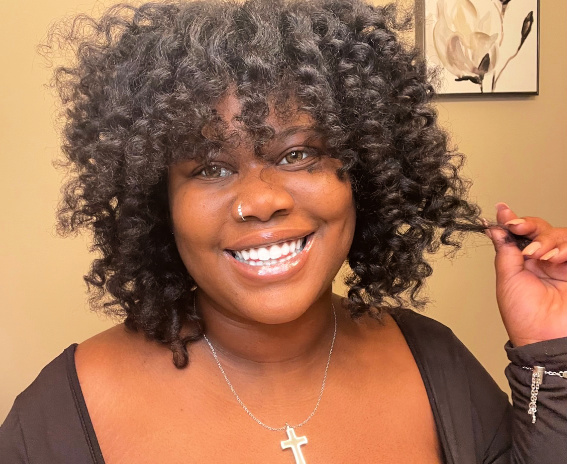Meaningful research has broad impact — and in some cases, a personal connection to a scholar. For Trejha Whitfield, a Ph.D. student and graduate teaching assistant in the Department of Communication, research has become an avenue of personal growth and an opportunity to help empower Black women. As a Black feminist scholar, Whitfield also thrives in educating others on the nuanced ways Black women develop and adapt their cultural identities through their hairstyles. Her most recent project is titled “My Kinky Hair is Beautiful: An Autoethnography of a Black Woman’s Identity Negotiation through Hair.”

Whitfield’s work, which was presented at the annual Graduate Research Symposium, is based in part on interviews with other Black women about their experiences with their hair. The present study takes an autoethnographic approach that reflects on Whitfield’s own experiences deciding how to wear her hair to her first national conference.
“As a Black woman, whether I choose to wear my hair natural in an afro, or style it in locs, braids, or wear a weave, I’m sending a message to the world about my identity,” she said. “That choice can be conscious or unconscious and can also be a political statement or an act of empowerment. There are lots of cultural generalizations for Black women that can be made from this choice.”
Whitfield’s research pointed to choices about hair as acts of both conformity and resistance.
“I used to think that I’d be more likely to blend in with straight hair than with an afro — I used to make those choices to, in a way, mitigate my Blackness,” she said. “Now, I no longer make an effort to hide or to dilute my Black identity. My hair is my choice, and I define what’s ‘acceptable’ or ‘professional.’ No matter how I wear it, I’m expressing my authentic self.”
Through the process, Whitfield says she experienced an “academic rebirth” in which she initially struggled to define her own research interests and role as a scholar. She credits the support of her advisors, mentors and colleagues in encouraging her to continue her journey of self-reflection and redefinition.
“It was an extremely vulnerable thing to do, but really affirmed that my experiences as a Black woman and as a Black scholar are valid and they matter. My experiences — and those of every other Black woman — are significant to many communities in academia and beyond,” said Whitfield. “My work also offers insights for a much larger audience seeking to understand the self-expressions and identities of themselves and others.”
Whitfield’s other research on Black women’s hair and body politics has also examined the effects of Eurocentric standards of beauty, stereotypes for Black American women when traveling abroad, and Black hair on YouTube. Her work is framed using Black feminist epistemology and Stella Ting-Toomey’s identity negotiation theory (INT). INT offers context for the processes through which an individual defines their own sociocultural identity through self-reflection of their own multifaceted cultural, ethnic, religious, social, gender, sexual, professional and/or social identities. The deeply personal and complex nature of Whitfield’s research led her to pursue qualitative research methods such as autoethnography, which prioritizes sharing and critically analyzing an individual’s multifaceted lived experiences. She also employs interviewing methods allowing other Black women to tell their own stories.
“Understanding your own personal and cultural identities can help you better understand others, especially those from different backgrounds,” said Whitfield. “It can be a challenging conversation to have with yourself, but really looking inward to understand how those factors influence who you are and how you perceive the world will improve how you’re able to relate to others, and in turn how you interact and communicate.”
Whitfield hopes that her work will help others develop a better understanding of their own personal identities, spark curiosity and conversation, and disrupt problematic social constructions that affect Black women.
“Sometimes, the best thing you can do when discussing a sensitive or unfamiliar subject is to just ask a question — show your interest,” she said. “It’s OK to be uncomfortable and to learn — and having the courage to engage in these conversations is supporting the development and expression of an individual’s unique and valuable identities.”
